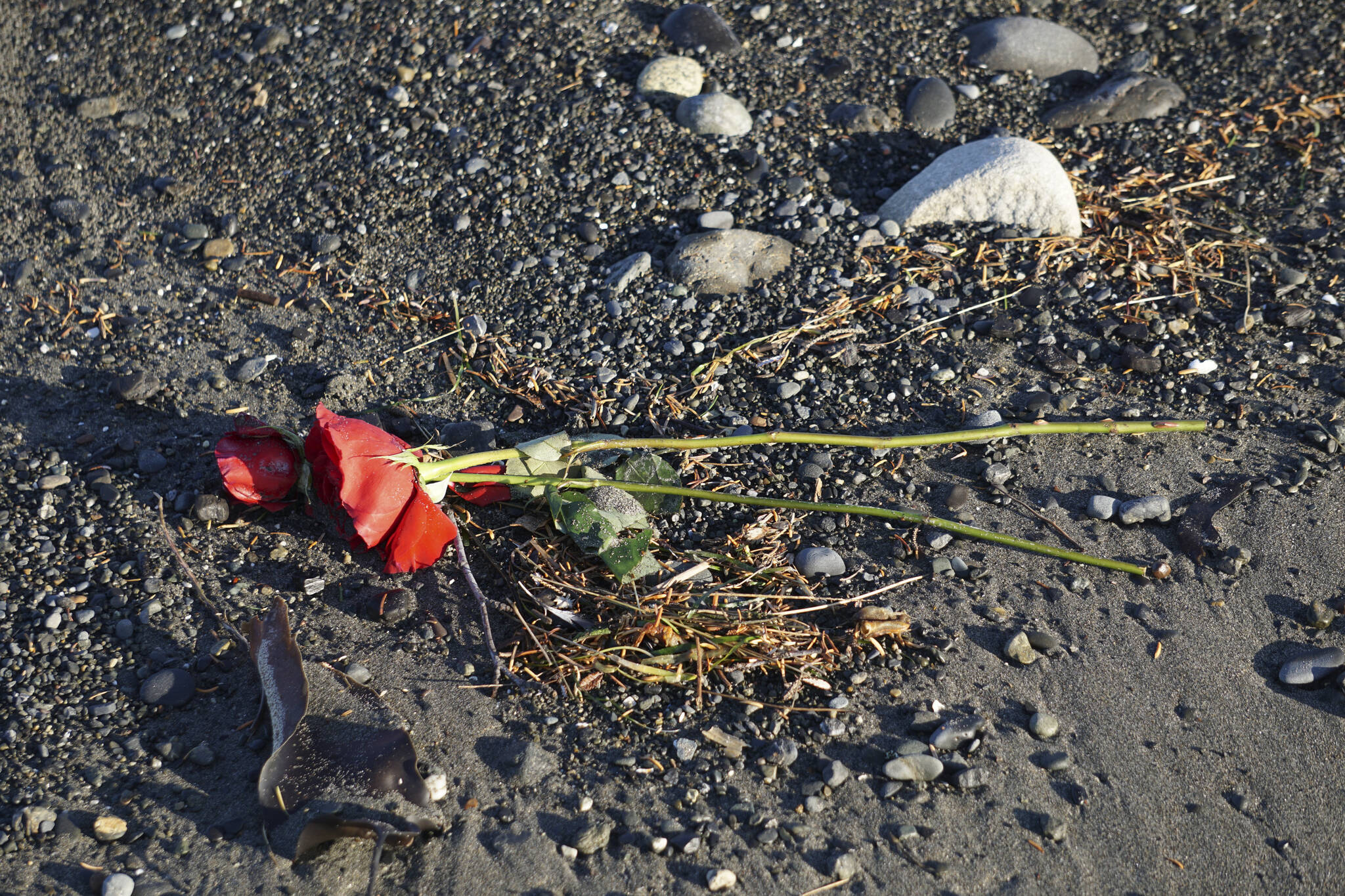Last Monday while walking the Homer Spit beach I came across two red roses and a scattering of petals that had washed up on the morning tide. I had dimly remembered this happening before.
Later I checked my Facebook feed, and weirdly in my memories folder appeared a photo I had taken of white roses that had washed up on the Homer Spit — five years to the day I took the photo of the red roses.
Along with salmon, beautiful scenery, glass floats and driftwood, Kachemak Bay offers memories and memorials.
I reshared the memory of the 2017 white rose photo in my Facebook feed and then the recent photo of the red roses, noting the odd coincidence. A friend sent me a message explaining the mystery: each year on the anniversary of his father’s death, friends and family toss roses into the bay to remember him.
When Homer people or people who love Homer die, quite often their family spread the ashes of their loved ones on Kachemak Bay. On the same day I found roses, a water taxi operator friend wrote of taking a family out on the bay to scatter the ashes of a loved one, also with flowers.
I have done this myself. After my mother died in 2015, the next year our family scattered Mom’s ashes off the beach of Tangier Island, Virginia, where Mom had lived in her teenage years. Mom’s brothers had died the same year, and we merged her ashes with those of Uncle Mark and Uncle Owen.
I saved a little packet of Mom’s ashes, and when her best friend Becky later visited us here in Homer, my sisters and I took Becky out for a tour of the bay and together we returned a part of Mom to a land she visited and loved.
One time I went halibut fishing on a charter with my oldest sister Marcia and her sons. About midway through, a couple at the stern of the boat said, “It’s time.” They took out a bag of ashes and performed the ceremony. We moved our lines to the bow to give them privacy.
I have even seen ashes wash up on the Spit. Years ago I came across a plastic container the size of a shoebox, its lid peeled open, that had gotten stuck on the high tide line by Mariner Park. Because I am a collector of marine debris, I looked into the odd box and found a plastic bag filled with a gray substance and cinched together by a brass tag that read “Anchorage Funeral Home.”
Oh no, I thought.
I called the Homer Police on that one, and Officer Ed Stading, God bless his soul, came out to recover it. I carried the box from the beach and gave it to Officer Stading, and he said if they couldn’t find the family, he would take it out on a boat and scatter the remains.
The remains had been of a woman from Nikiski whose family took a boat out into upper Cook Inlet and dropped the entire box overboard. A plastic box with a plastic bag, it turns out, will float, and that box drifted all the way to the Spit. I once interviewed a Seattle scientist who did surveys of washed-ashore dead birds, and she told me she had found a few boxes of cremated remains like that on the beaches there.
That’s another thing that washes up here: dead animals. I’ve found numerous sea otters and seals, and during the great murre die-off, hundreds of dead birds. One time I found on the Spit what at first glance looked like a human body, but it was a skinned black bear, and no, I do not know how a skinned bear wound up on the Spit. Bears without their fur look eerily like humans.
A few times I have found the wrack of tragedy. Near Diamond Creek decades ago I came across a small, wooden section of an airplane cabin, a cup holder complete with cups that had the airline logo. I researched that in the National Transportation Safety Board database and learned that came from a plane that crashed in lower Cook Inlet.
Another time while doing marine debris cleanup at Gore Point I found the collar from a flotation suit with the name of a boat. I looked that one up, too, and found it was from a ship that sank where several crew went missing. I called Coast Guard Sector Anchorage, and an officer said she would come by and pick it up the next time they were in town.
A few minutes later she called me back and said I should just take it to the Homer Police. I was glad to do that. That collar might have been a puzzle piece that solved the mystery of someone missing, or at least gave the family an artifact of memory.
Those of us who live by the ocean appreciate the power and beauty of it. There can be grace in returning bodies to the bay, transformed by heat into the most elemental form. When we return to the sea we become part of it, dust and bone drifting and merging together.
So scatter roses and memories, and if you should come upon such a sign on the beach, think of the love shared and its message spread.
Reach Michael Armstrong at marmstrong@homernews.com.

